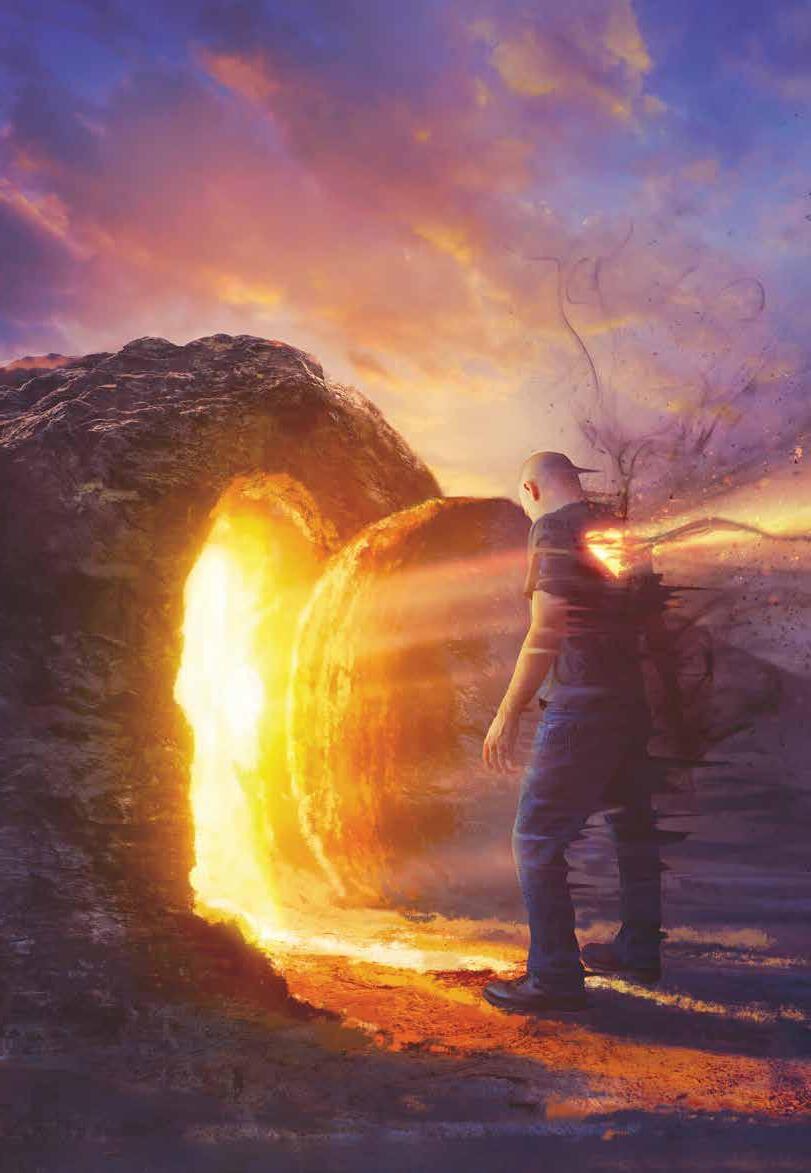WAR CRY
Red-letter daze
Cracking the confusion over one of the most important dates in the year



Matt Damon just does it in Nike film


Cracking the confusion over one of the most important dates in the year



Matt Damon just does it in Nike film


The Salvation Army is a Christian church and registered charity seeking to share the good news of Jesus and nurture committed followers of him. We also serve people without discrimination, care for creation and seek justice and reconciliation. We offer practical support and services in more than 700 centres throughout the UK. Go to salvationarmy.org.uk/find-a-church to find your nearest centre.
The Salvation Army first published a newspaper called the War Cry in London in December 1879, and we have continued to appear every week since then. Our name refers to our battle for people’s hearts and souls as we promote the positive impact of the Christian faith and The Salvation Army’s fight for greater social justice.
Issue No 7622
Editor: Andrew Stone, Major
Deputy Editor: Philip Halcrow
Production Editor: Ivan Radford

Assistant Editor: Sarah Olowofoyeku
Staff Writer: Emily Bright
Staff Writer: Claire Brine

Editorial Assistant: Linda McTurk
Graphic Designer: Rodney Kingston
Graphic Designer: Mark Knight
Email: warcry@salvationarmy.org.uk

The Salvation Army

United Kingdom and Ireland Territory 101 Newington Causeway London
SE1 6BN
Tel: 0845 634 0101

Subscriptions: 01933 445445 (option 1, option 1) or email: subscriptions@satcol.org
Founder: William Booth
General: Brian Peddle
Territorial Commander:
Commissioner Anthony Cotterill
Editor-in-Chief: Major Julian Watchorn
FOR many people, Easter is a time to hope for the start of springlike weather and to put on a little weight by eating chocolate eggs, all while enjoying the first bank holiday weekend since the new year.

What can seem rather irrelevant are the events of almost 2,000 years ago when a man was executed on a cross in a part of the world many miles away from the United Kingdom. What can be hard to believe are the claims by the man’s followers that, having been literally dead and buried, he rose to life again.
The impact that the events Christians remember this weekend have on the rest of society is not immediately obvious. But, because Christians do believe that Jesus died and rose again so that people can have a relationship with a loving God, communities across the country and the world benefit from their work every day.
To give a few examples, many youth clubs, older people’s lunch clubs, food parcels and school uniform banks are provided by Christians who are inspired in their efforts by their belief in a still-alive Jesus who gave up everything for others in an extraordinary act of love. In this week’s War Cry, we report on another example: the cafés that The Salvation Army runs to help victims of domestic abuse. We also hear from one woman who found acceptance and comfort from one of these cafés and who tells us how that support helped her to get her life back on track.
The only reason The Salvation Army exists is because its members – today and throughout its history – have believed in the relevance and truth of the events Christians celebrate at this time of year.
The reality of what happened to Jesus so long ago and so far away does still impact us all today, through the lives of his followers. Reflecting on the positive difference that faith could make to our own individual lives could be the highlight of our Easter this year.
Front-page picture: SHUTTERSTOCK.COM
THE year is 1984. Marketing executive Sonny Vaccaro (Matt Damon) is attempting to improve the fortunes of beleaguered brand Nike, whose basketball division is dwarfed by that of rivals Adidas and Converse. As an industry underdog, Nike struggles to attract top talent for its advertising campaigns, but Sonny comes up with a creative idea in comedy drama Air, a film based on a true story, which was released in cinemas on Wednesday (5 April).
Nike’s vice-president of marketing Rob Strasser (Jason Bateman) tries to rally his team. But Sonny grows increasingly frustrated at the lack of viable players to advertise for them and feels hamstrung by a limited budget.
Then one day, while rewatching tapes of the 1982 national championship-winning shot, he sees the scorer Michael Jordan’s full potential and pitches the idea of spending the entire celebrity contract budget of Nike’s basketball division on one player.
rookie to be the face of Nike’s basketball trainers. He decides that, rather than the player simply wearing the shoe, the shoe should be built around the player, and risks his entire career by driving from Oregon to North Carolina to make a personal appeal to Michael’s parents.
With authenticity and heart, he explains how he sees greatness in Michael, and how Nike can look after him in a way the big brands can’t. The player’s mother, Deloris (Viola Davis), seems impressed.

Sonny and Rob ask a designer to come up with a one-of-a-kind shoe, more colourful than anything else on the market, specifically for Michael: the Air Jordan. Nike’s team tries to devise the perfect pitch for a pivotal meeting. But the results aren’t guaranteed.
His colleagues think he’s mad. Nike CEO Phil Knight (Ben Affleck) believes the financial risk of gambling everything on one player is a step too far. Plus, Adidas and Converse are already courting Michael with lucrative contract deals.

But Sonny stands by the courage of his convictions and backs the young
Sometimes we all have to take a leap of faith. That could be embarking on a new career opportunity, starting a relationship or moving to a completely different place. As much as we plan and prepare, it can feel daunting to step out of our comfort zone. It’s always encouraging to hear stories of people who have done so and thrived.
One person who was familiar with stepping outside his comfort zone into new territory was an intrepid man
called Joshua. He took on rivals despite facing almost impossible odds. What emboldened him was his faith in God. Joshua felt that God was clearly saying to him ‘Be strong and courageous … do not be discouraged’ because God would be with him wherever he went (Joshua 1:9 New International Version). With God by his side, Joshua knew he could face his challenges undaunted.
That same source of strength and courage is available to us. God wants to have a relationship with each and every one of us, and can assist us in whatever challenges we encounter. Let’s not pass up the opportunity to receive his help.
Comedy drama tells the story of how invention and ingenuity became big businessFilm feature by Emily Bright Sonny (Matt Damon) meets Deloris (Viola Davis) Nike CEO Phil Knight (Ben Affleck)

 Interview by Claire Brine
Interview by Claire Brine
THIS Easter, Matt Britton is ticking an item off his bucket list. He has learnt by heart the entirety of Mark’s Gospel, found in the Bible, and is performing it in churches, prisons and schools across England and Wales.

‘The idea started in Christmas 2021,’ says Matt, an actor, director and writer who lives in Manchester. ‘Back then, everyone was still really frightened of catching Covid, so I thought that I wanted to spread a bit of good news. I wrote some monologues based on the characters in the Nativity story and decided to perform them in a pub in Salford.
‘Only 11 people turned up to watch
me. I thought the evening was going to be a huge failure. But after I’d performed, two people from the audience came up to me and one of them said: “That gave me goosebumps.”
‘Don’t get me wrong – I don’t think anybody in the audience came to faith that night. These two guys were blind drunk. But something happened for them in that pub. And I never forgot it.’
The following Christmas, while Matt was performing in a children’s theatre show, he thought ahead to 2023 and what his next acting job might be. He remembered the two men in the pub and an idea began to develop.
‘I knew that I had always wanted to learn a large portion of Scripture off by heart, so I thought that I’d try Mark’s Gospel and present it as a one-man show,’ he says. ‘I don’t really like calling it a “performance”, because it’s not quite like that. It’s traditional storytelling where I’m recreating what Mark wrote down verbatim. There’s no set, special lighting or gimmicks. It’s just me, inhabiting the characters and seeing what happens when you allow the power of the gospel to speak for itself.’
In 90 minutes, Matt speaks aloud all 16 chapters of the Gospel of Mark, which tells the story of Jesus’ ministry, death and resurrection. He explains that learning the text was a joy and a challenge.
‘I’m using the New International Version of the Gospel, and one of the things I noticed early on in my rehearsals was that Mark isn’t a playwright! He never set out to dramatise any of these stories about Jesus. Some of the key miracles – such as the feeding of the 5,000 – are just a few verses long. But even though Mark is the shortest Gospel, it works well on
For years, actor MATT BRITTON has been passionate about bringing the Bible to life. He explains why the Gospel of Mark should be heard (and not just read) – and why the first Easter remains the greatest story ever told
stage because it gets to the point. Firing off story after story means there’s no time for the audience to drift off or get bored. There’s a clear narrative and lots of action happening.’
One particular part of the action which Matt is keen to share with audiences is what happened at the very first Easter. He believes it is a story of love, betrayal, sacrifice, death and – when all hope seems lost – victory and new life. I ask him to tell me more in his own words.
‘While he has attracted a lot of followers, including his 12 disciples, he’s also had a few run-ins with the religious authorities. He’s become frustrated by their rules and traditions and how much they have been ignoring the heart of God, which is for the poor and marginalised.
‘When the religious leaders see the extent to which the Jewish people are siding with Jesus, they fear a riot. They know that they need to calm the situation down because Israel is under Roman occupation. So, they conspire to arrest Jesus and kill him.’
When the religious leaders fail to find enough evidence to convict him and put him to death, Jesus is beaten and taken to Pontius Pilate, the Roman governor.
‘Pilate finds nothing wrong in Jesus’ actions,’ Matt continues. ‘But he is scared. He doesn’t want news of a rioting crowd to get back to Rome. So he hands Jesus over to be crucified. The crowd watch as the soldiers nail him to a cross to die.
‘But then comes the beautiful part of the Easter story. Two days later, Jesus is alive. He has risen.’
To many, it sounds unbelievable. But as far as Matt is concerned, it’s not. Jesus’
‘In the run-up to Easter, Jesus has spent three years travelling from town to town, telling people about God’s love and performing miracles,’ he explains. Turn to page 6 f
After being betrayed by one of his disciples, named Judas, Jesus is taken to the Jewish council and questioned.

There’s no set, special lighting or gimmicks
From
page
resurrection is at the heart of his Christian faith.
‘If you take away the Resurrection, the whole of Christianity collapses,’ he says. ‘Without it, Jesus is just a man who ruffled people’s feathers and ended up getting punished for it, which is a shame, but it doesn’t really affect us today.

‘But because Jesus rose to life, the story becomes about beating death. On the cross, he paid the price for our sins – all the things that separate us from our Father God. His sacrifice meant we could be forgiven. And the Resurrection means we can experience new life – not just when we get to Heaven, but starting now. God is inviting us to be in relationship with him and to become repairers of this broken world.’
‘There were lots of times when the
‘And even though Jesus was very patient with them, he reached a point of saying: “How long shall I put up with you?” It was as if he was saying: “Have you still not got it yet?”
‘I think I’ve experienced moments like that in my own life, when I’ve tried to live by faith but still had doubts and questions. I can identify with the gaps in the disciples’ knowledge and understanding.
‘For me, the real heroes of the Easter story are the women. They don’t flee the crucifixion scene. They stay at the foot of the cross. And on Easter Day, when Jesus rises, they are the first at the tomb. They’re such good friends to him.’
The scene in which a small group of women discover that Jesus is alive signals the end of Mark’s Gospel – and the end of Matt’s performance. He hopes that audiences will go home talking about Jesus and take steps to discover the impact that knowing him can have on their lives.
‘I want people to go away asking questions and feeling mesmerised by him,’ he says. ‘I want them to see the charisma that Jesus had. The tour that I’m doing isn’t about taking the Gospel and “performing” it, but it’s about getting eye contact with people and telling them: “This happened.”’
l For more information visit mattbritton.co.uk

CHILDREN will be hunting for chocolate eggs. Some people will be making the most of their getaway midway through the first bank holiday weekend of the year. And some will be heading out at dawn for an early church service. It’s Easter Day – that special day in the calendar that comes round every year on 9 April. Or 31 March. Or 20 April. Or on any Sunday between 22 March and 25 April.
Whereas Christmas Day falls on 25 December every year, Easter moves around in a way that may be baffling to many people – but not to Dr Michael Carter. Michael is a senior properties historian at English Heritage, which cares for more than 400 buildings, monuments and other locations, including one site that played a major role in the story of how the date of Easter came to be determined in these islands.

‘To understand when Easter is celebrated, we have to go back to the biblical sources that tell us about the events behind the festival,’ he says.


‘We know from the Gospels that Christ’s crucifixion and resurrection happened around the time of the Jewish festival of the Passover.
‘Passover is determined by the cycles of the moon. In the fourth century, just after Christianity had gained toleration within the Roman Empire, the early Christian Church agreed that Christ’s resurrection must be celebrated on the first Sunday following the first full moon after the
Turn to page 8 f
It’s a red-letter day – but from year to year it can fall at very different times on the calendar. Historian Dr MICHAEL CARTER of English Heritage sheds some light on the timing of Easter and the role played in its observance by a monasteryInterview by Philip Halcrow
spring equinox. So Easter is based on the cycles of what is called the “paschal moon”.’

However, there was some disagreement about how to make the calculations.
‘And,’ Michael says, ‘it got complicated for the Church, especially in seventhcentury England.’
He explains: ‘In the fifth century, Germanic peoples – the Anglo-Saxons and Jutes – invaded and settled in what had been the Roman province of Britannia. These Germanic peoples didn’t share the Christian beliefs of many people in late Roman Britain, who were subsequently pushed to the western fringes of the British Isles. Starting in the sixth century, there were efforts to convert the peoples of Anglo-Saxon England to Christianity.’
One such mission began with the arrival in Kent in AD597 of the monk Augustine, who had been sent by Pope Gregory the Great.
‘He established a monastery on the edge of Canterbury and other sites as bases for the evangelisation of the peoples of Anglo-Saxon England. The monks spread out and in about 620 they arrived in Northumbria, which was the dominant kingdom of Anglo-Saxon England.
‘A parallel but separate programme of evangelisation had also started from the Irish monastery of Iona, off the western coast of Scotland, and those missionaries arrived in Northumbria about the same time.

‘It’s important to emphasise that the Roman and the Hiberno-Scottish missionaries shared the same fundamental beliefs. There was a lot more that united them than divided them. But they did have differences in observance and practice, and one of the biggest differences was how to calculate the date of Easter, even though the formula that the Irish missionaries had adopted was no longer
being used in the rest of Ireland.’
The differences were highlighted in the life of the King and Queen of Northumbria, as recorded shortly after events by the historian Bede.
Michael explains: ‘King Oswiu was a recent convert to Christianity and followed the Irish tradition. His wife, Eanflaed, was from Kent and followed the Roman traditions. Bede tells us that one year, the different ways of calculating Easter led to a scenario where the king was happily celebrating Easter while the queen and her household were still observing their Lenten fast.
‘Something had to be done. So Oswiu called a meeting of churchmen and nobles to agree on the timing of Easter once and for all.’
The resulting debate was held in 664 at a site that will be visited by holidaymakers over the Easter weekend: Whitby Abbey.
‘The meeting became known as the Synod of Whitby,’ says Michael. ‘It took place at the monastery of St Hild, and I think there were powerful reasons why her monastery was chosen. It was close to a river mouth and on the coast, so it was easy to get to. It was also a renowned centre of learning and, although Hild is not mentioned as actually being a participant, she was seen as a source of great counsel to everyone from princes to paupers.’
Michael describes what took place. ‘There are two main actors at the meeting. Colman, who is Bishop of Lindisfarne and effectively the court bishop for Oswiu, presents the Irish case. Then Wilfrid, a local boy who is abbot of Ripon, forcefully presents the Roman case.
‘They both appeal to apostolic tradition.
They shared the same fundamental beliefs
Colman says he is speaking from the tradition of St John the Evangelist, which has been mediated to him via St Columba. Wilfrid says he is speaking from the apostolic tradition of St Peter. And he quotes the words that Christ said to Peter: “You are Peter and upon this rock I shall build my Church.”
‘It’s a slam dunk. Oswiu turns to Colman and asks whether he can cite a similar authority. Colman has to say that he can’t.
‘Then Oswiu, fearful of appearing at the gates of Heaven, for which traditionally St Peter has been given the keys, says that, lest he does not gain admittance, he is siding with Wilfrid and his Roman tradition.
‘The king’s decision seems to have been accepted, except by Colman and a few of his adherents.’
The subject of the timing of Easter continued to be discussed in some quarters – and still is – but Michael says it
is interesting that ‘this unity of observance in England at the Synod of Whitby endures to this day. Even when England breaks away from the Pope in Rome in the 16th century, there’s no question of reverting to a different calendar for calculations about Easter.’

Dating from after the Norman Conquest, the buildings that can be seen on the site of Whitby Abbey today are not those of St Hild’s monastery. However, archaeology has uncovered plenty of material from the Anglo-Saxon period. ‘The site,’ says Michael, ‘remains important in telling the story of how we understand the history of this country, and I think you get a better understanding of history if you establish an emotional and – I use this in it broadest sense – a spiritual connection with the people who live before you.
‘In medieval times there would have been a huge sense of emotional release after the six long weeks of abstinence

during Lent. The great ceremonies, such as the dawn singing of the hymn “Christ the Lord is Risen Today” on Easter Sunday, would have provoked a real emotional response.’
Christmas may have turned into what perhaps can be seen as the most universally joyful festival, but, from a Christian perspective, it looks significant only because of the events marked at Easter.
‘In late medieval devotional meditations on the life of Christ,’ says Michael, ‘they start with the Annunciation and the Nativity and they go all the way through to the Passion, the Resurrection and then the Ascension – and it’s all seen as being part of the one story. OK, the Nativity is an essential step in the story, but medieval and later Christians would recognise what it culminates in. The story is about Christ’s death, his sacrifice on the cross, and then his triumph over death, offering humanity the chance of eternal life.’
It’s why Easter – whenever it falls – is, as Michael says, ‘the most important Christian festival of the year’.
The story is about Christ’s triumph over death
FOOD banks, debt advice, sheltered accommodation and support for survivors of modern slavery are just a few examples of the practical and caring support that The Salvation Army provides. But one element of its outreach that is perhaps less widely known is its support for survivors of domestic abuse – a line of work it has been involved in since its earliest days.

When the church and charity was founded in the late 19th century, it set up rescue homes for women fleeing domestic abuse and its work with survivors continues to this day. One way in which it provides help is through hosting support cafés for vulnerable women, where Salvation Army staff and volunteers provide a listening ear and practical support.
Captain Annette Wicks leads a Salvation Army church which runs a support café that hosts weekly drop-ins.
‘The Link café,’ she explains, ‘is a safe place where women who have fled domestic abuse can find peer support and be linked with other services – with a cup of coffee or tea and always some TLC.’
Annette adds that the emotional and practical help the café provides plays an
important part in enabling domestic abuse survivors to find their feet again.
‘Women are often traumatised by their experience and feel unable to deal with the many challenges they face in rebuilding their lives and the lives of their children, accessing health services, schools, benefits, and housing, never mind facing the courts,’ she says. ‘By supporting them at their own pace we are able to help women to find the strength to cope one day at a time.’
One woman who received assistance
from one of The Salvation Army’s support cafés is Marianna. After a troubled childhood in which her father physically abused her, Marianna found what she thought was a ray of hope in her 20s when she met a kind and considerate man called Jack. They set up home together, and she became pregnant soon afterwards. However, Jack gradually revealed his true colours and began subjecting her to cruelty and abuse.
‘He became violent in the second year of our relationship,’ Marianna
When Marianna escaped an abusive relationship, she wasn’t sure where to turn. Then she found one of The Salvation Army’s support cafés for domestic abuse survivors, which helped her back on her feet
Feature by Emily Bright
remembers. ‘Once he even broke a beer bottle over my head.’
Jack became increasingly controlling, particularly about money. But Marianna decided that she had to stay with him for the sake of their two children.
One day Marianna made a shocking discovery. She spotted a light blinking by her bed and was horrified to discover that it was a hidden camera. Jack had been recording and uploading videos of her online.
She had endured Jack’s abusive behaviour for years, but this was the final straw and she reported him to the police. He was arrested and served with a court order that banned him from any further contact with her.
While Marianna was now safe from Jack’s abuse, she was unable to find any sense of peace. She had been robbed of her self-respect, felt as if she couldn’t cope on her own and faced significant financial difficulties as she had depended on Jack for money.

Around that time, she was introduced to the support café. It became a welcome
and much needed solace to her. Marianna felt that the women at the support café made her feel ‘so comfortable and accepted’. Finally, she had found somewhere where she no longer had to feel anxious or ashamed.
Many of the women in the group that Marianna joined had experienced domestic violence themselves and they continue to be a source of strength to her. ‘The women help each other and even hearing other people’s stories is helpful,’ she says. Staff and volunteers listened sympathetically to Marianna’s story and signposted her to the relevant support services. She received food parcels from The Salvation Army for her and her children. The church and charity helped her to find a solicitor to ensure that she kept custody of her two children. The staff also showed her how to apply for financial support and equipped her to secure a new job as a youth worker. She is currently training to become a teaching assistant and says she now knows that she can turn her life around.
The Salvation Army serves those of all faiths and none, but its work was founded on Christianity, a faith which inspires many of its staff and volunteers to serve others. Christians believe that God unconditionally cares for and loves everyone, bestowing them with unique value and purpose.
As a Christian minister, Annette says that the motivation behind the work of The Salvation Army through its support café is that ‘every woman is made in the image of God and is loved by God’.
She continues: ‘The love we show to our ladies allows them to experience that. It takes such strength and courage to escape domestic abuse. Our project helps these brave women who have broken free to stay free.’
l Some names have been changed. For more information about the help that The Salvation Army gives visit salvationarmy.org.uk
She knows that she can turn her life aroundLIBRARY PICTURE POSED BY MODELS
THE War Cry invites readers to send in requests for prayer, including the first names of individuals and details of their circumstances, for publication. Send your Prayerlink requests to warcry@salvationarmy.org.uk or to War Cry, 101 Newington Causeway, London SE1 6BN. Mark your correspondence ‘Confidential’.



There is no set formula to becoming a Christian, but many people have found saying this prayer to be a helpful first step to a relationship with God
Lord Jesus Christ, I am truly sorry for the things I have done wrong in my life. Please forgive me. I now turn from everything that I know is wrong.
Thank you that you died on the cross for me so that I could be forgiven and set free.
Thank you that you offer me forgiveness and the gift of your Holy Spirit. Please come into my life by your Holy Spirit to be with me for ever.
Thank you, Lord Jesus.
Amen

THIS weekend, children up and down the land will be tucking into chocolate Easter eggs. I remember being about six or seven years old and smashing into an egg (the brand of which shall remain nameless) which I expected to contain a toy but which I was kind-of-surprised to find was empty. You can imagine my dismay and disappointment.
While Easter is generally hailed as a day of celebration, the first Easter Day morning actually began with disappointment. In Luke’s Gospel we find the story of two long-faced men who are on a journey away from Jerusalem. Luke tells us that these men had been followers of Jesus and were completely devastated when he was crucified and buried in a tomb.
The story continues that, on their journey of disappointment, they are joined by a stranger who walks with them part of the way, listens to their sorrows and then shares a meal with them. As they eat together, the two men realise that the stranger who is with them is, in fact, Jesus. He isn’t dead after all, but had been raised to life again. They then run back to Jerusalem to tell everyone else about it. The Easter story has turned their disappointment into pure joy and a new journey begins for these two men.
That is the message that is at the heart of the Easter story. Death turns into life. Sorrow turns into celebration. Disappointment turns into joy. If you have ever found yourself wondering where you are going in life, the great news that Christians observe on Easter Day is that Jesus really is risen from the dead and will meet us wherever we are on life’s road.
Jesus can turn our lives around too: anxiety into peace, sadness into joy, the mundane into meaningful. Believing in the power of the Easter story and following Jesus for ourselves can set us on a whole new journey in our lives. Why not try it this Easter – you won’t be disappointed.
1 2 3 4 5 6
Which American actor is also known by his wrestling name The Rock?
In the nursery rhyme ‘Hey Diddle Diddle’, what ran away with the spoon?
Who wrote the gothic novel Frankenstein?
What is the biggest planet in our solar system?
In which European city would you find a statue called Manneken-Pis?
‘Wannabe’ was the first No 1 single for which girl group?
TWENTY-FIVE years ago, on 10 April, an agreement was reached to bring an end to the Troubles – the conflict over the status of Northern Ireland that began in the late 1960s and cost thousands of lives.

The Good Friday agreement was a step towards reconciliation between a divided people. The Corrymeela community in Ballycastle, Co Antrim, had been working for reconciliation on the island since 1965 and continues to do so today. Alex Wimberly, the organisation’s leader, says Corrymeela is ‘an ecumenical Christian community which believes that reconciliation is at the heart of the gospel’.
‘Our founder, Ray Davey, said that if churches can’t speak of reconciliation, they have nothing to say,’ he says.
Much of the work of Corrymeela centres on building relationships with others that bridge the differences between them with the aim of fostering reconciliation.
‘People have to take the spirit of courage and hope from the Good Friday agreement,’ Alex says, ‘and realise we can create a future together which is not based on a zerosum game where if somebody wins, somebody else has to lose. We have to find win-win solutions to build a just and lasting peace.’
To mark the anniversary of the Good Friday agreement, the Corrymeela community is hosting a number of events, including conferences to discuss the future, and a service of recommitment to the underlying principles of the agreement. While Corrymeela does not impose its Christian faith on people, it is at the heart of its mission.
This weekend, Christians everywhere remember the reconciliation at the heart of their faith. They give thanks that, because of Jesus’ death and resurrection, all people can be reconciled to God and find peace and hope for new life in a relationship with him.
Thinking about the Good Friday agreement within the context of Easter and Jesus’ once-for-all sacrifice, Alex says: ‘Judgement was coming for all of us, yet we were spared.
‘The power of the Good Friday agreement in some ways is that we now realise no one needs to die for us to be freed from the sin that divides.’

A quarter of a century after the Good Friday agreement was reached, ALEX WIMBERLY, leader of the Corrymeela community in Co Antrim, explains how the work of reconciliation is still going on in Northern Ireland
Interview by Sarah OlowofoyekuIrish prime minister Bertie Ahern, US senator George Mitchell and British prime minister Tony Blair after signing the Good Friday agreement in 1998
‘We need a spirit of courage to create a future’
Alex WimberlyASSOCIATED PRESS/ALAMY

Each solution starts on the coloured cell and reads clockwise round the number 1.



Look up, down, forwards, backwards and diagonally on the grid to find these words associated with Easter
SERVES 4



1tbsp olive oil
100g cold butter, diced
1 small onion, chopped


2 garlic cloves, crushed
175g risotto rice
700ml hot vegetable stock
Salt and freshly ground pepper
200g fresh peas



200g broad beans
15 spinach leaves
50g Parmesan cheese, shaved
Pea shoots, to garnish
SERVES 2

Heat the oil and about ¼ of the butter in a large shallow pan over a medium heat. Add the onion and garlic, then turn the heat to low and cook until softened and transparent.
Add the rice and stir to coat all the grains. Increase the heat and add 100ml stock.
Cook until absorbed.
Gradually add more stock, a ladleful at a time, stirring until absorbed, before adding more. Continue cooking for about 20 minutes, until the rice is tender, but still has a little bite.
Season to taste with salt and pepper.
Bring a pan of salted water to the boil and cook the peas and beans for 2-3 minutes. Add the spinach for the last minute of cooking time. Drain well and set aside.
Remove the rice from the heat and stir in the remaining butter, Parmesan, peas, beans and spinach. Season to taste and garnish with pea shoots.

INGREDIENTS

2 red peppers, cored, seeded and sliced
150g cherry tomatoes, halved 100g pitted green olives, sliced 4tbsp olive oil

Salt and freshly ground black pepper
2 x 225g thick skinless cod fillets, pin-boned
Preheat the oven to 190C/375F/Gas Mark 5. In a baking dish, toss the peppers, tomatoes and olives with 2tbsp olive oil and plenty of salt and pepper, to taste.
Sit the cod fillets on top and season them with salt and pepper before drizzling them with the remaining olive oil.
Bake for 10-14 minutes, until the cod is cooked through and the peppers and tomatoes are just soft to the tip of a knife. Remove from the oven and garnish with the chervil, before serving.

